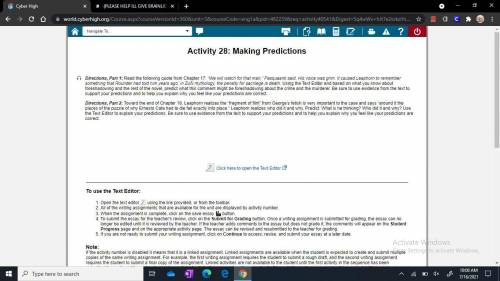
Directions, Part 1: Read the following quote from Chapter 17: “We will watch for that man,” Pasquaanti said. His voice was grim. It caused Leaphorn to remember something that Rounder had told him years ago; in Zuñi mythology, the penalty for sacrilege is death. Using the Text Editor and based on what you know about foreshadowing and the rest of the novel, predict what this comment might be foreshadowing about the crime and the murderer. Be sure to use evidence from the text to support your predictions and to help you explain why you feel like your predictions are correct. Directions, Part 2: Toward the end of Chapter 18, Leaphorn realizes the “fragment of flint” from George’s fetish is very important to the case and says “around it the pieces of the puzzle of why Ernesto Cata had to die fell exactly into place.” Leaphorn realizes who did it and why. Predict: What is he thinking? Who did it and why? Use the Text Editor to explain your predictions. Be sure to use evidence from the text to support your predictions and to help you explain why you feel like your predictions are correct.


Answers: 2


Another question on English

English, 21.06.2019 16:30
“unlike my opponent, i propose freedom from crime, freedom from poverty, and freedom from unemployment “ what rhetorical approach is the speaker most likely to be talking in this sentence? a. the speaker wants the audience to question the meaning of freedom and redifine it. b. the speaker wants the structure of this sentence to stand out in the listeners minds. c. the speaker wants to anticipate and address w counter-argument from his or her opponent. d. the speaker wants to transition into a topic that is largely unrelated to previous topics.
Answers: 1

English, 21.06.2019 22:00
Which statement expresses a theme that is found in both "escape" and "to live"? the search for self–awareness is often a difficult one. life's distractions can make it difficult to know yourself. a person often sees herself differently than others see her. being a part of two cultures can make it hard to know yourself.
Answers: 3

English, 22.06.2019 01:30
Who said this in of pride & prejudice, and what type of irony does it show? “you mistake me, my dear. i have a high respect for your nerves. they are my old friends. i have heard you mention them with consideration these twenty years at least.” a.mrs. bennet: situational irony b.mr. bingley: dramatic irony c.elizabeth: proverbial irony d.mr. bennet: verbal irony
Answers: 1

English, 22.06.2019 01:50
Plagiarism quiz read both the paragraph below and the information following it that identifies the source using the american psychological association format. then read each of the numbered statements and determine if each is plagiarized or not. circle “yes” if the statement is plagiarized, “no” if it is not, and then fix the “yes” answers). original source the presence of the taiwanese on everest was a matter of grave concern to most of the other expeditions on the mountain. there was a very real fear that the taiwanese would suffer a calamity that would compel other expeditions to come to their aid, risking further lives, to say nothing of jeopardizing the opportunity for other climbers to reach the summit. but the taiwanese were by no means the only group that seemed egregiously unqualified. camped beside us at base camp was a twenty-five-year-old norwegian climber named peter neby, who announced his intention to make a solo ascent of the southwest face, one of the peak’s most dangerous and technically demanding routes—despite the fact that his himalayan experience was limited to two ascents of neighboring island peak, a 20,274-foot bump that required little more than vigorous walking. krakauer, j. (1998). into thin air: a personal account of the mount everest disaster. new york: anchor books, 122 - 3. student samples yes 1. there was a very real fear that the taiwanese would suffer a calamity that would compel other expeditions to come to their aid(krakauer, 1998). no) 2. many climbers overestimate their abilities, as krakauer (1998) explains when he writes of peter neby, whose himalayan experience in the past “required little more than vigorous walking” (122 - 3). no 3. jon krakauer (1998) discusses other concerns besides those of unpredictable weather and his own climbing group’s capabilities. for example the existence of a taiwanese group on everest was a matter of serious unease to most everyone else on the mountain. yes/no 4. krakauer (1998) states that the taiwanese group was not the only inexpert climbers to attempt mt. everest: camped beside us at base camp was a twenty-five-year-old norwegian climber named peter neby. . [whose] himalayan experience was limited to two ascents of neighboring island peak, a 20,274-foot bump that required little more than vigorous walking (122 – 3). yes/no 5. the author asserts that the taiwanese “were by no means the only group that seemed egregiously unqualified.” yes/no 6. in his book into thin air, jon krakauer (1998) discusses many of the dangers he noted prior to his disastrous attempt to climb mt. everest in 1996. among them were encounters with other groups and individual climbers who were ill-trained and ill-equipped to handle the demands of such a climb.
Answers: 2
You know the right answer?
Directions, Part 1: Read the following quote from Chapter 17: “We will watch for that man,” Pasquaan...
Questions


Mathematics, 11.11.2019 05:31


Mathematics, 11.11.2019 05:31




Chemistry, 11.11.2019 05:31

Chemistry, 11.11.2019 05:31



History, 11.11.2019 05:31

Mathematics, 11.11.2019 05:31


Mathematics, 11.11.2019 05:31

English, 11.11.2019 05:31

History, 11.11.2019 05:31

Mathematics, 11.11.2019 05:31


Biology, 11.11.2019 05:31



